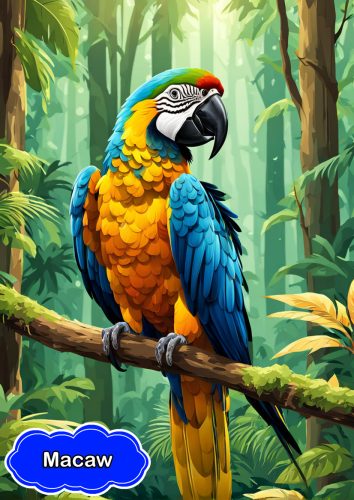
Here are some lesser-known facts about macaws:
- Social Structure: Macaws are highly social birds that live in flocks, often consisting of 10 to 30 individuals. Their social bonds are strong, and they engage in various social behaviors, including grooming and playing.
- Intelligence: Macaws are known for their high intelligence. They can learn to mimic human speech and sounds, solve puzzles, and even use tools. Their cognitive abilities make them engaging companions but also require mental stimulation.
- Vibrant Colors: Macaws come in a variety of colors and patterns, with some species like the scarlet macaw exhibiting bright red, blue, and yellow feathers. Their vibrant plumage is not just for show; it plays a role in attracting mates.
- Strong Beaks: Macaws have powerful, curved beaks designed to crack open tough nuts and seeds. Their beaks are strong enough to break through hard shells, and they can use them to manipulate objects.
- Lifespan: Macaws can have surprisingly long lifespans, often living 30 to 50 years in captivity, with some individuals reaching over 70 years. This longevity means they require a long-term commitment from their owners.
- Habitat Diversity: While many people associate macaws with rainforests, they can also be found in savannas, woodlands, and even mangroves. Their habitats vary depending on the species.
- Endangered Status: Several macaw species, such as the Spix’s macaw, are critically endangered due to habitat loss, poaching, and the illegal pet trade. Conservation efforts are underway to protect these vulnerable species.
- Complex Vocalizations: Macaws communicate through a variety of vocalizations, including screeches, whistles, and squawks. Their calls can carry over long distances, helping them stay connected within their flocks.
- Diet Variety: While they primarily eat seeds, nuts, and fruits, macaws also consume flowers and leaves. Their diet is essential for maintaining healthy plumage and overall health.
- Parental Care: Macaws are dedicated parents. They typically mate for life and take turns incubating their eggs and caring for their young, which are altricial at birth, meaning they are born helpless and rely entirely on their parents for care.
These intriguing facts highlight the unique behaviors and ecological importance of macaws!
More resources:
Animals Coloring and Learning eBook
Animals Free Fun Learning eBook
Notes:
– All materials are strictly for personal use only.
– Do not reproduce and/or redistribute any part of these materials.
– Use these materials under parents’ and/or guardians’ guidance/supervision/approval.
![]()